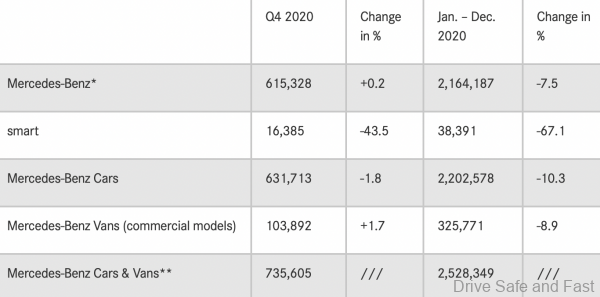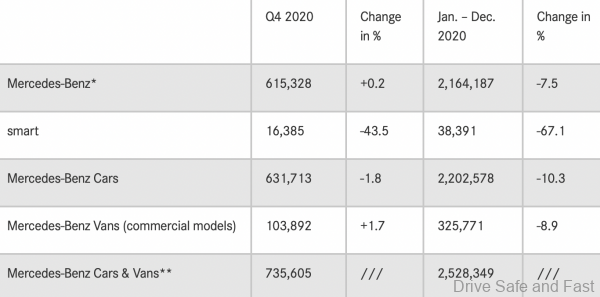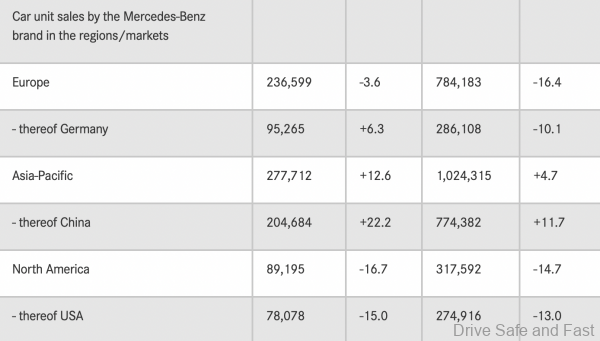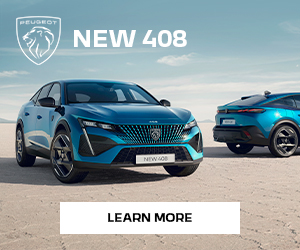Mercedes-Benz Global Sales Down In 2020 By Significant Margin
We all know by now that some automakers managed to escape 2020 with some actual improvements in sales (like Mazda in the USA) or by exceeding original sales targets (like Perodua in Malaysia). However, for many other brands the silver lining is a little tougher to see. Take Mercedes-Benz, for instance. In 2020, their passenger car division took a major dip with a year-on-year percentage drop of 10.3%. This was weighed down further by a significant drop in sales of their struggling ‘smart’ sub brand.

However, on the plus side, the company says it has made significant strides in the realm of xEVs, which includes plug-in hybrid and pure electric car sales. They moved some 20,000 all-electric EQCs, 1,700 EQVs and 115,000 plug-in hybrids in 2020. All-electric smart models, ironically bolstered this category despite overall low sales with 27,000 units. Daimler claim the combined total of xEVs sold worldwide marks a 228.8% increase over 2019’s numbers.

Here’s the press release with more, including regional sales numbers.
PRESS RELEASE
Mercedes-Benz is accelerating its journey towards CO2 neutrality. Significant progress was made in 2020, with a steep increase in xEV deliveries: More than 160,000 plug-in hybrids and all-electric vehicles were sold by Mercedes-Benz Cars worldwide (+228.8%), including about 87,000 units in the fourth quarter
At Mercedes-Benz Cars, the xEV share increased from 2% in 2019 to 7.4% last year. Sales of plug-in hybrids almost quadrupled to more than 115,000 units. Approximately 20,000 EQC (combined electrical consumption: 21.5 kWh/100 km; combined CO2 emissions: 0 g/km)* were handed over to customers worldwide. The EQV (combined electrical consumption: 26.4 kWh/100 km; combined CO2 emissions: 0 g/km)* achieved sales of about 1,700 vehicles. Deliveries of the all-electric smart models totalled approximately 27,000 units, a strong double-digit increase (+45.6%) compared with the previous sales record in 2019 (18,400 units).
2021 stands above all for the acceleration of electrification at Mercedes-Benz Cars. A total of four new Mercedes-EQ models will be presented: the EQA, EQB, EQE and EQS. The Mercedes-Benz plug-in hybrid family, currently consisting of more than 20 model variants, will be renewed with electrified derivatives of the C-Class and the S-Class. For 2021, Mercedes-Benz Cars expects to increase the xEV share to approximately 13%.
Mercedes-Benz achieves strong passenger car sales performance in challenging year
Despite the major challenges posed by the COVID-19 pandemic, Mercedes-Benz delivered more than two million cars for the fifth consecutive year. Through advanced digitization in sales and service, Mercedes-Benz was able to respond to the rapidly changing situation and the various regulatory requirements during the pandemic. With sales of 2,164,187 units (-7.5%), Mercedes-Benz maintained its leading global position compared with its core competitors.
“2020 placed great demands on us as a society. For Mercedes-Benz, the safety and health of our customers is our top priority. Dealerships and sales partners were able to meet the diverse customer requirements with creative, digital and contactless customer advice. We are delighted that our models continue to be so popular in these challenging times. The new S-Class in particular is inspiring and fascinating, as can already be seen from the high number of more than 40,000 orders worldwide,” said Britta Seeger, Member of the Board of Management of Daimler AG and Mercedes‑Benz AG responsible for Marketing and Sales.
Mercedes-Benz passenger car sales by regions and markets
Mercedes-Benz benefited from the ongoing recovery in many markets in the second half of the year. 1,024,315 units were sold in the Asia-Pacific region (+4.7%). The main sales driver was China, with an unprecedented recovery: due to a double-digit growth of 11.7%, a new sales record with 774,382 units was achieved. In the Europe region, the brand delivered 784,183 passenger cars last year (-16.4%), while in Germany, Mercedes-Benz sold a total of 286,108 cars (‑10.1%). Sales in the North America region totalled 317,592 units (-14.7%). Mercedes-Benz delivered 274,916 cars in the USA last year (-13.0%). Overall, the largest markets for Mercedes-Benz were China, Germany and the USA, followed by Great Britain and South Korea.
Sales of Mercedes-Benz Cars
Last year, the S-Class was again the best-selling luxury sedan worldwide with about 60,000 units (-17.2%). The new S‑Class, presented by Mercedes-Benz in September, met with a very strong positive customer response: More than 40,000 orders have been received worldwide, already exceeding the order intake after the sales start of its predecessor. A total of approximately 691,000 compact cars (A-Class, A-Class Saloon, B-Class, CLA Coupé, CLA Shooting Brake, GLA and GLB) were delivered worldwide (+3.6%). Sales of SUVs (GLA, GLB, GLC, GLC Coupé, EQC, GLE, GLE Coupé, GLS and G-Class) were about 885,000 vehicles (+12.9%). The GLE (+32.3%) and GLS (+21.1%) in particular enjoyed high customer demand. The best-selling model of Mercedes-Benz was the GLC with approximately 320,000 units.
The Mercedes-AMG sports and high-performance brand sold 125,129 vehicles worldwide (-5.3%). A new sales record and a growth of 1.5% was achieved in the USA, the brand’s largest market. Furthermore, a new record was also achieved in the important growth market of China (+32.3%). The USA, Germany, China, Japan and Australia were AMG’s largest markets.
A total of 38,391 vehicles of the smart brand were handed over to customers (-67.1%). The largest market for smart was Germany: There, strong demand for all-electric models was significantly boosted by the German government subsidy, which led to doubled electric smart deliveries (+104.9%).
Mercedes-Benz Vans sales for commercial use
Despite COVID-19 related lockdowns in several countries, in the fourth quarter Mercedes-Benz Vans was able to match the high level of the prior-year period with sales of its commercial models: 103,892 Sprinter vans, Vitos, Vito Tourers and Citans were sold in that period. 325.771 Sprinter vans, Vitos, Vito Tourers and Citans were sold in the full year, down by 8.9% compared with 2019. At the same time, the launch of the eVito in additional markets and the market launch of the eSprinter more than tripled sales of electric vehicles.
“We are entering the new year with confidence, as we achieved very strong sales figures in the last two quarters. However, due to the global pandemic and numerous lockdowns, we saw a decrease in sales of our vans. Our electric vans are making a positive contribution to unit sales. We delivered a total of almost 6,200 electric vans worldwide. In Europe, we are the market leader in the segments of electric mid-size and large vans, each with a market share of more than one third,” said Marcus Breitschwerdt, Head of Mercedes-Benz Vans.
Overview of retail sales by Mercedes-Benz Cars & Vans
















